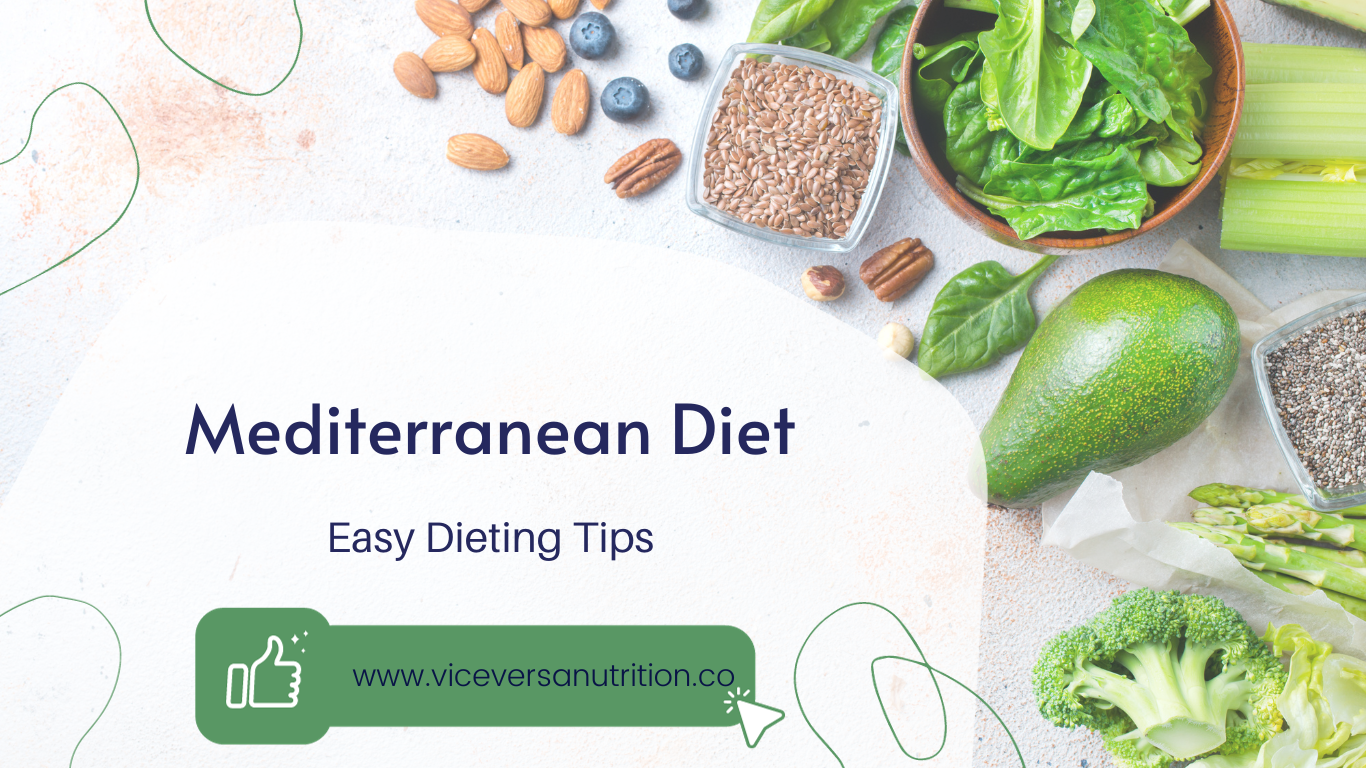
In the previous blog post we calculated the amount of calories we need for our specific body type. In this blog post we are going to look at the Mediterranean diet and why this diet may suit you and what this diet consists of.
The Mediterranean diet has gained popularity in recent years, with its emphasis on fresh and whole foods inspired by the eating habits of countries such as Greece, Italy, and Spain. With a Greek/Cypriot background, i was brought up and raised on a Mediterranean diet, the endless variety and combinations of food is just great and feels like home. In this blog post, we will explore who can benefit the most from following a Mediterranean diet, as well as who should avoid it. We will also discuss the pros and cons of this diet, and provide an example of a typical Mediterranean meal plan. Whether you're looking to improve your health or simply add some variety to your meals, keep reading to find out if the Mediterranean diet is the right fit for you.
Unveiling the Mediterranean Diet: An Overview
The Mediterranean diet is a way of eating that is inspired by the traditional dietary patterns of countries surrounding the Mediterranean Sea. It is known for its emphasis on fresh fruits and vegetables, whole grains, lean proteins, and healthy fats like olive oil. The diet also includes moderate amounts of dairy products and red wine ("moderate" thought i would put that in quotations before everyone gets over excited). The Mediterranean diet has been associated with numerous health benefits which we will reveal later. It is also praised for its ability to promote weight loss and improve overall well-being. In the next sections, we will delve deeper into who can benefit from following a Mediterranean diet, as well as who should approach it with caution. Stay tuned!
Who stands to benefit from a Mediterranean Diet?
The Mediterranean diet can benefit a wide range of individuals, regardless of age or health status. This diet is particularly suitable for those who are looking to improve their heart health, as it is associated with a reduced risk of heart disease and stroke. Additionally, individuals who are interested in weight loss can also benefit from the Mediterranean diet, as it emphasises whole foods and healthy fats that can help control appetite and promote a feeling of fullness. Moreover, people with diabetes or those at risk for type 2 diabetes can also benefit from the Mediterranean diet due to its focus on complex carbohydrates and low glycemic index foods (carbohydrates rated on how they effect blood sugar levels) Lastly, individuals who are looking to adopt a sustainable and enjoyable way of eating can find the Mediterranean diet appealing, as it allows for a wide variety of delicious and nutritious foods.
Who Should Tread Carefully: The Mediterranean Diet Isn't for Everyone
Whilst the Mediterranean diet offers numerous health benefits, it may not be suitable for everyone. Individuals with specific dietary restrictions, such as those with allergies or intolerances' to certain foods, should exercise caution when considering this diet. The emphasis on whole grains, fruits, and vegetables may also pose challenges for individuals with certain medical conditions, such as irritable bowel syndrome or digestive disorders. Additionally, those who struggle with incorporating higher fat foods, like olive oil and nuts, into their diet should approach the Mediterranean diet with caution. It's important to consult with a healthcare professional or registered dietitian before making any significant changes to your diet to ensure it aligns with your individual needs and goals.
Sampling the Mediterranean Cuisine: A One-Week Mediterranean Diet Plan
Looking to incorporate the Mediterranean diet into your weekly meal plan? Look no further! Here's a one-week Mediterranean diet plan to get you started. To make the most out of this diet use your BMI and BMR results to indicate the amount of calories you should be aiming for daily. You can then weigh up the food accordingly.
Day 1
- Breakfast: Greek yoghurt with fresh berries and a sprinkle of almonds.
- Lunch: Wholemeal wrap filled with grilled chicken, mixed greens, and tzatziki sauce.
- Dinner: Baked salmon with roasted vegetables and a side of quinoa.
- Snacks: Houmous with carrot sticks and a handful of olives.
Day 2
- Breakfast: Omelette with spinach, feta cheese, and cherry tomatoes.
- Lunch: Mediterranean salad with mixed greens, cherry tomatoes, cucumber, feta cheese, and a drizzle of olive oil.
- Dinner: Wholemeal pasta with grilled vegetables and a tomato-based sauce.
- Snacks: Greek yoghurt with honey and a handful of nuts.
Day 3
- Breakfast: Wholemeal toast topped with avocado, poached eggs, and a sprinkle of feta cheese.
- Lunch: Mediterranean grain bowl with quinoa, roasted chickpeas, cherry tomatoes, cucumber, and a lemon tahini dressing.
- Dinner: Grilled chicken breast with a side of grilled courgette and couscous.
- Snacks: Fresh fruit salad and a small portion of dark chocolate.
Day 4
- Breakfast: Overnight oats with almond milk, chia seeds, and mixed berries.
- Lunch: Mediterranean-style wrap with grilled vegetables, houmous, and a sprinkle of feta cheese.
- Dinner: Baked white fish with a side of sautéed spinach and brown rice.
- Snacks: Greek yoghurt with a drizzle of honey and a handful of almonds.
Day 5
- Breakfast: Veggie scramble with bell peppers, onions, and feta cheese.
- Lunch: Mediterranean quinoa salad with diced tomatoes, cucumber, olives, and a lemon vinaigrette.
- Dinner: Grilled prawn skewers with roasted vegetables and a side of wholemeal pita bread.
- Snacks: Carrot sticks with houmous and a small portion of dried fruit.
Day 6
- Breakfast: Wholemeal toast topped with smashed avocado and smoked salmon.
- Lunch: Greek salad with mixed greens, cherry tomatoes, cucumber, olives, and a light feta dressing.
- Dinner: Lentil soup with a side of grilled chicken and a slice of wholemeal bread.
- Snacks: Greek yoghurt with fresh fruit and a sprinkling of granola.
Day 7
Combine a mixture of the previous meals. This will encourage you to take control and it also makes good practice for the future in decision making.
Thank you for taking the time to read this blog post. You are one step closer to becoming a healthier you!
